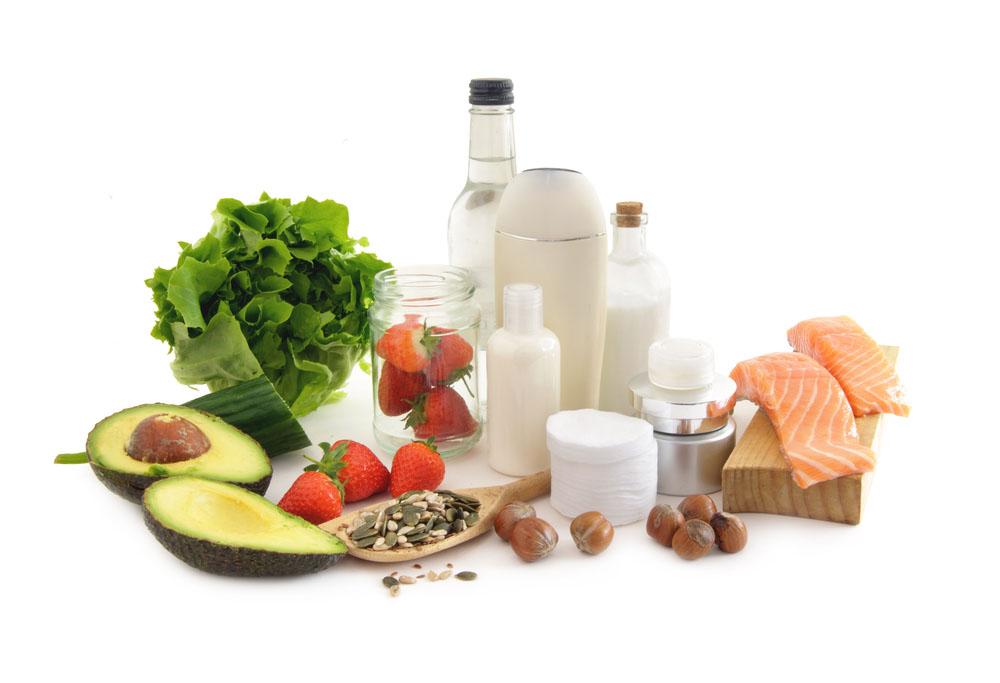
It matters - unfortunately, we often forget about it, we use various types of creams, masks and cosmetic procedures, and the condition of our skin still leaves much to be desired. Why is this happening?
Nutritional errors are increasingly guilty. We work a lot, we have little time, so we eat on the run choosing highly processed products. Our body gets less and less necessary for the proper functioning of vitamins and minerals. Of course, the diet will not improve all the imperfections of our skin, but if it goes hand in hand with proper care can significantly improve its condition.
So what to eat to keep your young and healthy appearance as long as possible?
Vitamins of all ages
The skin needs them at every stage of our lives, so it is very important to compose a daily diet so that the most important ones for its healthy appearance are not missing on our plates.
Provitamin A (ß carotene)
It provides an adequate level of hydration, prevents keratosis, promotes regeneration, firms, improves color and strengthens protection against the harmful effects of sunlight, and thanks to the antioxidant effect delays the effects of aging. You will find it, e.g. in carrots, sweet potatoes, peppers, pumpkins, melons, apricots, peaches and green leafy vegetables such as spinach, kale, parsley and lettuce. Sources of vitamin A are also broccoli, butter, egg yolks, salmon, eel, sardines and blue cheese.
Another carotenoid - the natural pigment lycopene - is also a very strong antioxidant. Thanks to it, the skin retains its density and youth for longer. It also strengthens the natural protective barrier against UV rays. You will find it primarily in tomatoes, but also in watermelon, red grapefruit and rosehips. Because lycopene is fat-soluble, its bioavailability will be higher if we supply it to the body in the company of e.g. oil or olive oil. Our body will better absorb it in processed form, e.g. in the form of a sauce or soup with the addition of olive oil, juices and concentrates.
Vitamin E
Also called the vitamin of youth, it will avoid the formation of calluses, accelerate the healing of pimples and seborrheic dermatitis, strengthen blood vessels, make it more elastic, moisturize and additionally protect the skin against free radicals and damage caused by excessive sun exposure. You will find it in nuts, almonds, corn, eggs, vegetable oils, green leaf vegetables, avocados, buckwheat, oatmeal and cereal sprouts. Remember that natural vitamin E is best absorbed for us, so it's better to take care of a diet that will help you supplement it rather than reaching for artificial supplementation.
Vitamin C
It improves skin regeneration processes, accelerates wound healing, makes scars elastic, helping to fight stretch marks, strengthens and seals blood vessels, it also has an important role in the collagen formation process. Its deficiencies can contribute to the formation of acne, broken capillaries and the formation of spider veins. Its sources are strawberries, blackcurrant, mango, kiwi, oranges, lemons, rosehips, tomatoes, new potatoes, cabbage and Brussels sprouts.
B vitamins
They improve blood circulation, give the skin a healthy color, protect against the formation of unsightly bites, accelerate regenerative processes, protect against harmful external factors, reduce fatigue and affect the proper functioning of sebaceous glands. So that they do not run out of our body, remember to eat dried fruit, bananas, avocados, spinach, whole grains, cheese, lean meat, fish and nuts.
Vitamin K
Its deficiency is often seen in the form of bursting vessels and bruises under the eyes. Vitamin K is necessary in the process of proper blood clotting, supports the condition of blood vessels, thanks to which the skin becomes well supplied with blood and oxygenated. You will improve the appearance of your skin if you take care of its proper level in the body. Your menu should include: broccoli, turnips, spinach, cucumbers, lettuce, avocados, potatoes, eggs and dairy products.
Healthy fat
It is also very important to provide the body with unsaturated fatty acids. Thanks to them, you will reduce skin problems associated with excessive drying. Their correct amount in the diet is especially important for people with dry skin problems and suffering from psoriasis.
Therefore, even if you are losing weight, do not give up fats, choose the good ones, eat fatty sea fish, nuts and pumpkin seeds. Instead, use salads and linseed oils as an addition to salads and salads.
The skin needs minerals
Minerals, like vitamins, are very important for the body, support the work of each of its cells. If they are at the right level, our skin will also be in good condition, and thus retain its youth and beautiful appearance for longer.
Copper and iron
Copper is an extremely important mineral for the preservation of beautiful skin, it has antibacterial, nourishing and what is very important delaying the effects of aging. It participates in the process of skin creation and regeneration, increasing collagen and elastin production. It is also a powerful antioxidant and protects against the harmful effects of free radicals. Its sources are e.g. legumes, nuts, buckwheat, egg yolks, seafood, wheat grains, sesame seeds and cacao beans. In addition, it supports the absorption and proper use of iron in the body, which in turn makes the skin properly supplied with blood and nourished. However, its deficiency leads to anemia, as a result of which the skin becomes pale dry and rough. You will find iron, e.g. in whole grains, seafood, nuts, sesame seeds, pumpkin seeds, cocoa, Brussels sprouts, broccoli, kale, parsley and legumes.
Calcium
Smoothes and softens the skin. Its deficiency can cause inflammation and intensify allergic reactions. So let's take care of the right amount of dairy products in your diet.
Potassium
Supports skin prone to acne and excessive dryness. Dried fruits, avocados, bananas, tomatoes, potatoes and green leafy vegetables will provide it.
Iodine
If it is not enough, the skin will become rough, dry and begin to peel. On the knees and elbows, on the other hand, we notice dark, callous epidermis. Iodine can be found in sea fish, cabbage, spinach, asparagus and tomatoes. Remember, however, that its excess can intensify acne lesions.

Silicon
Supports delicate skin with capillaries, elasticizing and strengthening blood vessels, and participating in collagen biosynthesis, improves its elasticity and elasticity. By controlling the work of the sebaceous glands, it reduces sebum production by acting anti-acne. Its source is carrots, beets, cucumbers, garlic, bran and buckwheat. It's also worth replacing ordinary black tea with horsetail tea.
Zinc
It is one of the most important micronutrients present in our body. It helps the skin maintain a healthy color, prevents the formation of blackheads and pimples, accelerates the healing process, and by taking part in the processing of fatty acids, collagen and elastin synthesis supports its regeneration and delays aging. Its sources are lean poultry meat, oysters, hard cheese, milk, egg yolks, sea fish, nuts, whole grains and legumes.
Remember to irrigate
Water is necessary for the proper functioning of our entire body, despite the fact that it has no nutritional value. Responsible for transporting nutrients to cells and excretion of waste products and toxins. The lack of it can not only cause dryness and unhealthy appearance of the skin, but also disrupt the work of other organs and seriously threaten life. Of course, still mineral water is the best. However, part of your daily requirement for it can be replaced with herbal and fruit teas and fresh fruit or vegetable juices.
As you can see, what is on our plate is also an important element supporting the daily care of our skin. Remember, however, that just like using cosmetics and applying cosmetic procedures, you should also use common sense and moderation.
